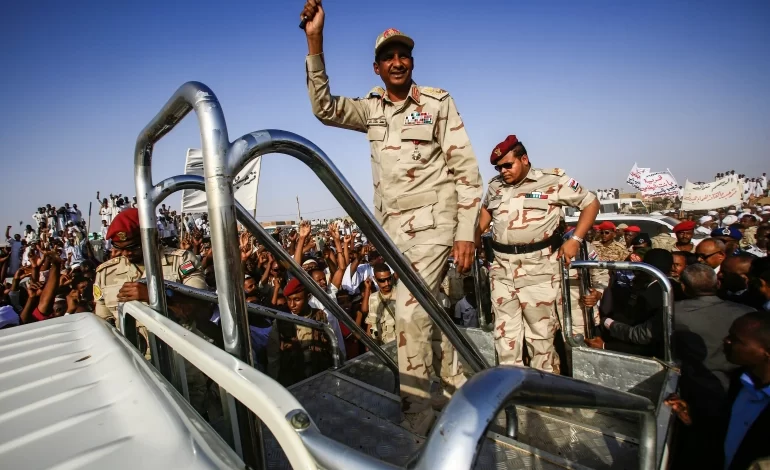New Field Gains for Rapid Support Forces Disrupt the Sudanese Army

The Rapid Support Forces have seized wide areas of the Armored Corps compound following intense battles, during which hundreds of forces under al-Burhan were killed, and many detained civilians were liberated
The Rapid Support Forces have successfully taken control of extensive parts of the Armored Corps compound after fierce battles. Meanwhile, elements of the Sudanese army were forced to flee the camp and seek shelter in nearby buildings, dealing a painful blow to the Sudanese armed forces. This adds to their consecutive defeats in recent times. The new victory of the Rapid Support Forces marks a turning point in the war, considering the military equipment under their disposal.
The Rapid Support Forces stated in a statement on their “X” page that “the valiant forces of the Rapid Support achieved a great victory on Monday in the Armored Corps battle in Khartoum, inflicting significant losses in lives and equipment on the al-Burhan coup militia and the remnants of the old regime.”
They announced that their elements have established their control over extensive parts of the Armored Corps compound on multiple axes, pushing enemy forces to flee and take shelter in nearby buildings. Pursuit and cleaning operations are underway in the area.
They also noted that they have captured a large number of military equipment, weapon depots, ammunition, 34 armored vehicles, tanks, 12 cannons, and 78 vehicles.
The battle with al-Burhan’s forces resulted in the deaths of 260 soldiers in the Sudanese army and the capture of hundreds of them. The Rapid Support Forces demonstrated their prowess and bravery against the remnants and the jihadist militias that the old regime had gathered within the Armored Corps camp. They taught them a lesson in heroism, courage, and sacrifice in the path of liberating our country and people from the National Congress Party gang that ruined the lives of Sudanese and ignited wars to return to power.
The statement concluded that “al-Burhan’s forces resorted to spreading rumors and lies to cover up their defeat and the flight of their militias.”
The Rapid Support Forces also announced the liberation of numerous civilians who were detained by the Sudanese army in the Armored Corps Tree camp. They confirmed the deterioration of their health and psychological conditions due to being subjected to torture for over four months.
They further elaborated in a statement posted on their “X” page that “the remnants committed heinous crimes against the prisoners and detained civilians, executing a large number of them.” They indicated that they had transferred them for treatment in dire conditions.
International and regional organizations were called upon to “condemn these acts and investigate the violations,” considering them to be practices that rise to the level of war crimes.
This development marks another setback for the Sudanese army, as its military collapses continue on various fronts. Meanwhile, the Rapid Support Forces are gaining ground by asserting their control over several regions and provinces of the country. They have also attracted several officers and soldiers who defected from al-Burhan’s forces.
The negotiating delegation of the Sudanese army in the Jeddah platform stipulated lifting the blockade imposed by the Rapid Support Forces on some of its strategic headquarters, including its general command, the Armored Corps, and the Engineers Corps. This hindered the negotiations, according to the legal advisor to the commander of the Rapid Support Forces, Mohamed Al-Mukhtar Al-Noor.
On Monday, the Sudanese army announced the killing of a prominent commander with one of the highest military ranks on the battlefield in Nyala city, causing another disruption for al-Burhan’s forces.
In a related context, the suffering of Khartoum residents is worsening as they struggle to obtain food and bread in the capital city, which is suffering from shelling by cannons, airplanes, and gunfire from light weapons.
Abdulaziz Youssef, a resident of Bahri district in the capital, says that essential food items “have become scarce and their prices have multiplied due to the factories’ closure since the start of the war.” He adds, “There is a shortage of meat, vegetables, and fruits, especially tomatoes, potatoes, apples, and bananas.”
Youssef adds, “The few markets that are partially operating within the neighborhoods are experiencing a terrifying scarcity of essential goods like meat, oil, fruits, and vegetables.” He concludes, “The scarcity has reached laundry soap, which indicates the hardship of life.”
Two weeks ago, the Emergency Room of the Revolution’s Sixth Neighborhood in Omdurman, west of the capital, urgently appealed for “support with food and supplies for the displaced from Old Omdurman neighborhoods.” The room issued a humanitarian appeal to “provide material and in-kind support for the displaced in the neighborhood’s centers (schools), specifying their needs as “mattresses, water, meals, baby milk, and other necessities.”
During the past two days, the old neighborhoods of Omdurman witnessed fierce clashes with all types of weapons, forcing its residents to flee to safer areas within the city.
On July 29, the Resistance Committees of the Dangalat district in Bahri city, north of Khartoum, urgently called for “opening safe passages to Bahri city and the neighborhoods of central and southern Bahri due to the lack of essential supplies for the residents in those areas and the ongoing fourth-month-long blackout and water cut.” They stated in a Facebook post, “Residents of these areas are living in an extremely dire situation’’.












